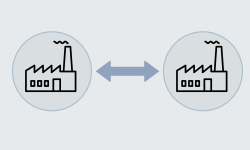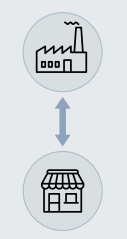Cartel prosecution

What is a cartel?
Cartels are anti-competitive agreements between companies which restrict competition. Anti-competitive agreements often lead to excessive prices coupled with inferior product quality. At the same time the elimination of competition undermines the ability of companies to innovate. Cartels thus harm the economy as a whole and consumers in particular.
Pursuant to Section 1 of the German Competition Act (Gesetz gegen Wettbewerbsbeschränkungen – GWB), cartels are generally prohibited in Germany.
The law reads as follows: “Agreements between undertakings, decisions by associations of undertakings and concerted practices which have as their object or effect the prevention, restriction or distortion of competition are prohibited.”
European law also provides for a general ban on cartels in Article 101 TFEU.
The Bundeskartellamt applies this rule in addition to Section 1 GWB if the anti-competitive agreement is likely to affect trade between Member States of the European Union.
European Commission or Bundeskartellamt – which is the best placed authority?
Cases in which European law is (also) applicable are notified within the network of European competition authorities, the European Competition network ECN, and are dealt with by the best placed authority. As a rule, the European Commission is to be considered the best placed authority if an infringement affects competition in more than three Member States.
Different types of cartels
Anti-competitive agreements can take different forms. Particularly serious types of anti-competitive agreements are those concluded between competitors on prices or quantities and on the allocation of sales areas or customer groups (‘hardcore cartels’). The prohibition of anti-competitive agreements can also apply to other types of agreements, e.g. cooperation agreements or market information systems.
| Price cartel | Quota cartel | Agreements on customer allocation and division of sales areas |
|---|---|---|
| Companies agree on their future pricing strategy. | Companies carve up a market between them based on a specific quota, thus preventing each other from competing. | Companies divide specific customer groups or market areas among themselves, thus preventing each other from competing. |
| Example: Eleven breweries agreed to raise the prices of draught and bottled beers. Among other aspects, they agreed to raise the price of a crate of beer by about one euro in early 2008. | Example: For many years several rail manufacturers guaranteed each other relatively stable shares of Deutsche Bahn’s order volume. The cartel members allocated projects among themselves and monitored compliance with the quota they had agreed. | Example:The three major German sugar manufacturers agreed to generally limit their sales of sugar in Germany to specific sales areas and not to get in the way of the other cartel members in their respective areas. It was not possible to be supplied by a sugar manufacturer from another region, even at the customers’ specific request. |
The prohibition of cartels also applies to agreements between companies that are active at different market levels. For example, agreements on retail prices concluded between manufacturers and retailers are prohibited. In this context, only non-binding price recommendations are permissible (recommended retail price, RRP).
Horizontal agreements: 
Agreements between actual or potential competitors operating at the same market level are referred to as horizontal agreements.
Example: Several chocolate manufacturers agree on price increases for their products.
Vertical agreements: 
Anti-competitive agreements can also be concluded between companies operating at different market levels, for example to agree on binding retail prices.
Example: A manufacturer of outdoor jackets concludes an agreement with a retailer to ensure that the retailer will charge the manufacturer’s recommended retail price (RRP). This is not the only type of agreement that is prohibited. Manufacturers must not pressure retailers and, for example, threaten to stop supplies in order to ensure that certain retail prices are maintained. All retailers are free to set their own prices.
Exceptions
Under certain conditions anti-competitive agreements are permissible. Examples:
- If the agreements serve to improve the production of goods or promote technical progress while allowing consumers a fair share of the resulting benefit.
- If they help to improve the companies’ competitiveness, certain forms of cooperation between small and medium-sized companies are permissible (‘cartel of small or medium-sized enterprises’).
- If the agreements are based on special regulations at German or European level for certain economic sectors such as agriculture or publishing.
Benefits of cartel prosecution
Combatting illegal cartels has immediate positive effects on the economy and consumers. Cartels cause great harm to the economy as a whole because they lead to higher prices, lower product quality and less innovation. This harm can only be prevented if cartels are effectively prosecuted.
Scientific studies indicate that cartels result in average price increases of up to around 15 per cent.
Once a cartel has been uncovered, the pressure from restored competition often immediately leads to lower prices. The companies need to make an effort again to win over customers. The benefits of effective cartel prosecution are therefore considerable, especially for consumers.
Cartel agreements also cause immense monetary damage to the public sector. Just like private consumers, the Federal Government, the Länder and the municipalities have to pay excessive prices if cartels are not detected and terminated. Click here for more information on bid-rigging agreements.




